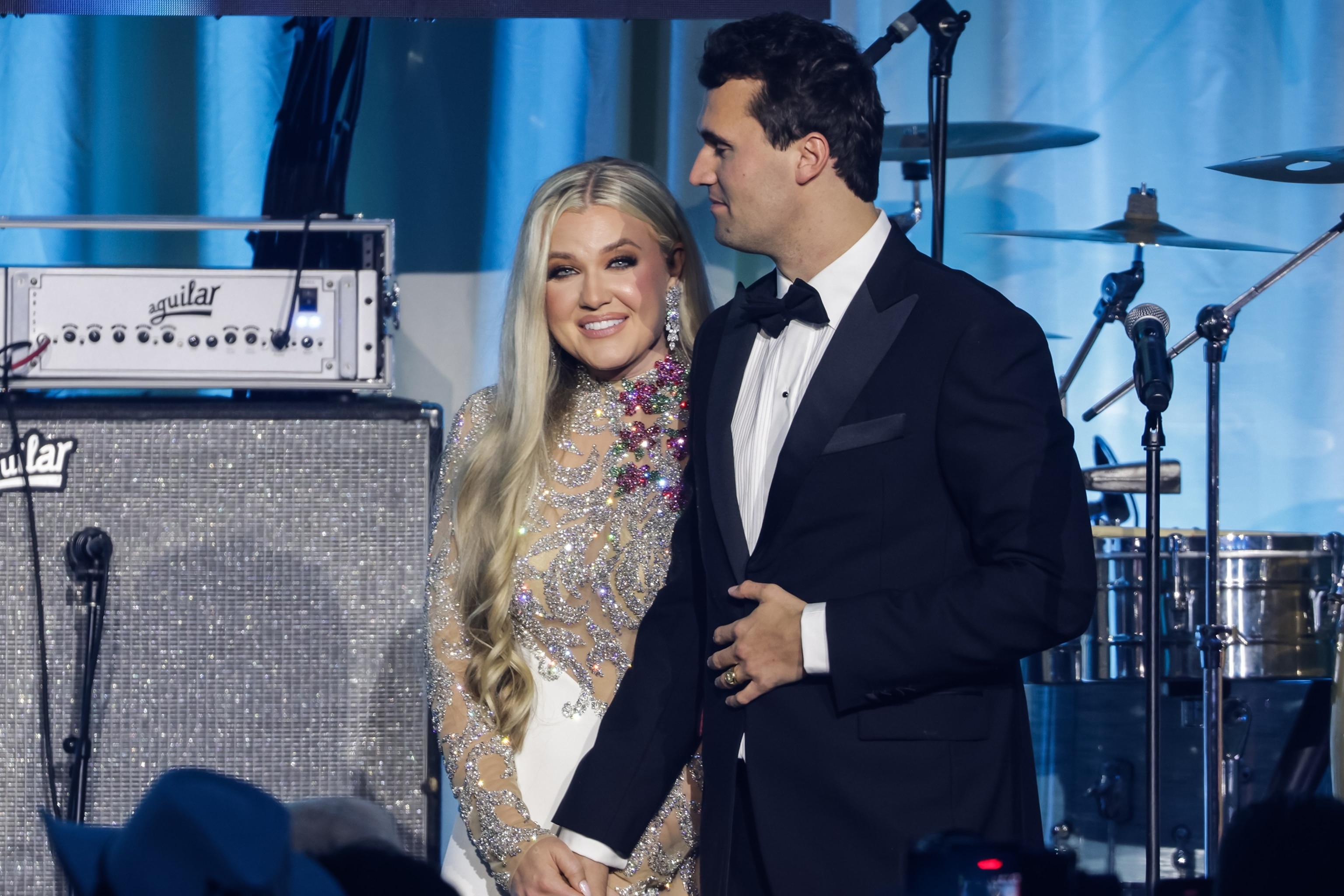
The assassination of Charlie Kirk — the outspoken founder of Turning Point USA — during a college event in Utah has shaken the very core of America’s political and cultural life. What began as a horrifying act of violence has quickly become something larger: a national reckoning on free speech, political polarization, and the meaning of unity in divided times.
At the center of this transformation stands Karoline Leavitt, a rising political figure whose call for a nationwide minute of silence has ignited a patriotic movement few could have predicted. By urging Congress, schools, churches, and civic institutions across the nation to begin every gathering with a moment of silent tribute, Leavitt has turned grief into ritual, and ritual into a movement that now echoes far beyond partisan boundaries.
A Death That Shocked the Nation
Charlie Kirk was no stranger to controversy. As the founder of Turning Point USA, he built a reputation as one of the loudest voices on college campuses — challenging professors, rallying conservative students, and sparking debates that often turned explosive. Loved by supporters and loathed by detractors, Kirk thrived on confrontation, positioning himself as the voice of young conservatism in an era of cultural upheaval.
But no one expected his career — or his life — to end this way. When gunfire rang out during a campus event in Utah, America witnessed what many had feared: that words, no matter how fiery, could provoke violence. The images and videos of that day spread instantly, cementing the tragedy in the public consciousness.
For some, Kirk’s death symbolized the dangers of unchecked political extremism. For others, it underscored the fragility of free speech in an environment where ideological clashes had grown increasingly hostile. For all, however, it marked a turning point.
Karoline Leavitt’s Call for Silence
Into this atmosphere stepped Karoline Leavitt. Once known as a quick-witted conservative spokesperson, she has now emerged as a symbolic leader, pushing for a movement of remembrance.
Her words were simple yet profound:
“Charlie’s death cannot be in vain. Let us pause before every meeting, every game, every classroom lecture, and every session of Congress — not merely to honor his life, but to remember what he fought for: faith, freedom, and the courage to speak even when it costs everything.”
By calling for silence, Leavitt reframed the narrative. This was not just about mourning a fallen figure. It was about embedding his legacy into the daily life of a fractured nation.
Why Silence Resonates
Ritual silence has a unique power. It is wordless yet profound, binding people across lines of class, creed, and politics. America has long used silence to mark collective trauma — from the moments of quiet after Pearl Harbor to the nationwide pauses following 9/11.

But Leavitt’s proposal stands apart. Unlike those commemorations, which honored tragedies inflicted by external enemies, this silence addresses violence within America itself: political violence, ideological hatred, and the silencing of dissent through fear.
Dr. Henry Wallace, a historian at Georgetown, put it this way:
“Silence has always been a way of saying what words cannot. But in this case, silence speaks directly to the fragility of our democracy. To stop, even briefly, is to acknowledge that we cannot afford to kill one another over our differences.”
The Rapid Spread of the Movement
What began as a statement quickly became a cultural wave. Within days, schools across the Midwest announced they would begin the practice. Churches adopted it during Sunday services. Sports teams, before kickoff or tipoff, paused in collective tribute.
Videos on social media — marked with the hashtag #MinuteForCharlie — flooded platforms like TikTok and Instagram. In one, a group of high school students in rural Ohio bowed their heads before class. In another, thousands of fans at a football stadium stood in total silence before a game, the only sound the flapping of flags above the field.
In workplaces, too, the ritual has taken hold. Major corporations, particularly those with large American consumer bases, have encouraged offices to incorporate the minute of silence into meetings. For many employees, it has become a moment not just of mourning but of reflection.
Support and Criticism
Predictably, Leavitt’s call has not been universally embraced. Supporters argue that the gesture is unifying, nonpartisan, and rooted in patriotism. Critics, however, question whether elevating a political figure into a national ritual risks further dividing the country.
Senator Maria Cortez, a Democrat from California, voiced concern:
“We must honor the dead, but we must also guard against enshrining partisan leaders into civic rituals. America needs symbols of unity, yes — but carefully chosen ones.”
Yet others see the minute of silence as precisely the kind of symbol America needs. Senator Josh Hawley countered:
“This is bigger than Charlie Kirk. It’s about the right of Americans to speak freely, even if it costs them their lives. That’s something worth pausing for.”
Beyond Politics: A Cultural Shift
What makes the movement striking is its penetration beyond politics. In small towns and big cities alike, the silence has been adopted organically. Community centers, Little League games, even neighborhood gatherings have embraced the ritual.

For many Americans, it is less about Kirk himself and more about the larger values his death has come to represent: courage in the face of opposition, the sanctity of free speech, and the cost of defending one’s convictions.
A teacher in Texas explained it this way:
“My students don’t all know who Charlie Kirk was. But when we pause, I tell them it’s about remembering that words should never be answered with bullets. They understand that. And they respect it.”
Historical Parallels
The transformation of Kirk’s death into a ritual of unity echoes earlier moments in American history. When Abraham Lincoln was assassinated, the nation mourned not just the man but the principle of union he represented. After Martin Luther King Jr.’s assassination, silence became a tool of civil rights remembrance.
“History shows that the deaths of polarizing figures often lead to broader cultural reflection,” noted Dr. Wallace. “What matters is not whether one agreed with them, but what their loss reveals about the nation at large.”
The Future of the Movement
Karoline Leavitt has signaled that this is only the beginning. Reports suggest she is drafting a congressional resolution that would formalize the practice, requiring each session of Congress to begin with a minute of silence in Kirk’s memory.
Meanwhile, Turning Point USA has announced the launch of the Charlie Kirk Freedom Foundation, dedicated to protecting free speech on college campuses. Early donors have already pledged millions, suggesting that Kirk’s death may fuel not just remembrance but a sustained infrastructure for activism.

Whether the movement will endure remains to be seen. History is filled with moments of collective mourning that faded as time passed. Yet the speed, scale, and emotion behind Leavitt’s call suggest it could become a fixture of American civic life.
A Silence That Roars
In a nation often defined by shouting — political debates, culture wars, and media clashes — silence has now emerged as the most powerful sound. What began as a moment of horror has become a ritual of unity.
Whether one admired Charlie Kirk or opposed him, the silence speaks to something deeper: a shared recognition that violence cannot be the final word in America’s story.
As Karoline Leavitt said in her closing words:
“One minute of silence. One minute of unity. One minute for America.”
In that minute, America is not divided red or blue, left or right. For sixty seconds, it remembers that it is one nation — and that some voices, even when silenced, still speak.



